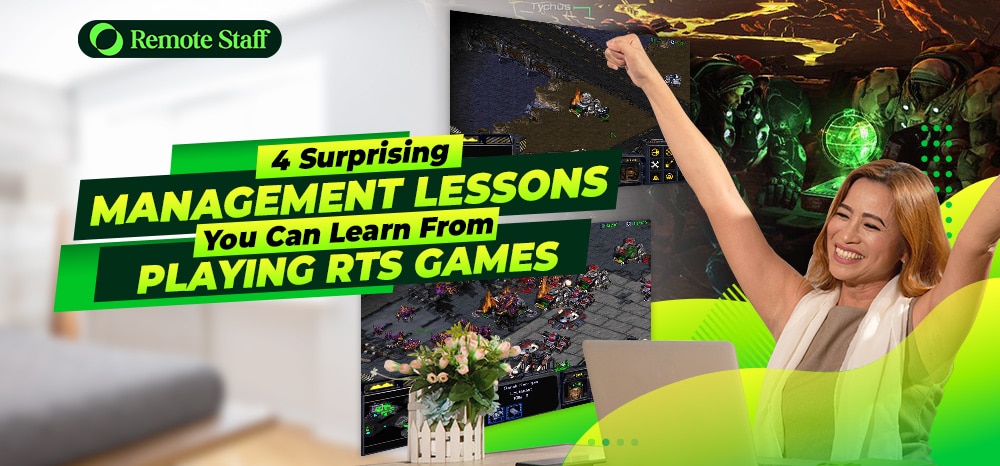Team management, especially in a remote setting, is very challenging. You have to balance monitoring your subordinates with achieving your own tasks, communicate regularly and effectively with them via Skype or Zoom, and attend meetings with other managers.
Fortunately, there are many ways you can develop your management skills to become a better manager. These include attending leadership seminars and coaching.
Besides these, there is another, lesser-known though more entertaining way to develop management skills. And that is through learning management lessons from RTS games.
RTS, or Real Time Strategy games, are time-based video games centered around gaining and using resources to build units to defeat your enemy. Here, a player must learn to develop their base and gain resources, defend it from attacks, and attack their opponent’s base.
So, what management lessons can you learn from RTS games? Let’s find out.

Balance Your Micro and Macro.
In RTS terms, micro (short for micromanagement) refers to a person’s ability for specific unit control. Compare this with macro or macro-management, which refers to the player’s map awareness, resource management, and overall strategy.
Learning to balance these two is one of the fundamental aspects of RTS. Focusing too much on micro causes you to tunnel vision and lose the game of resources against your opponent. On the other hand, focusing too much on macro can cause you to take on unnecessary losses in your units, which would also be detrimental in the long run.
Similarly, when managing your remote team, be careful not to breathe down your subordinates’ necks. Doing so shows that you don’t trust them, which is demoralizing for anyone. That said, being too distant from them because you’re too focused on the team’s overall goals may cause confusion when you don’t check in with your subordinates regularly.
Finding the perfect balance between managing your team and the larger picture enables you and your team to be more productive at work.

Have Clear and Manageable Goals.
When playing an RTS, you have one clear goal: defeat your opponent. Everything, from your micro and macro to your strategy, is a means to achieve this.
You build your base to gain resources, then use these resources to build units and structures to take more from your opponent. Rinse and repeat until you finally beat your opponent.
When managing your team, your goals aren’t always clear-cut. So one of the most crucial management lessons you can learn from RTS games is establishing clear goals for you and your team.
Start with the main goal you want your team to achieve within a given time. Then establish steps on how you can achieve it and make your way towards small victories. One way to do this is via Key Productivity Indicators (KPIs).
KPIs enable you to know if you’ve made progress, no matter how small, achieving your main goal. This is similar to establishing which parts of the map you should take and what units you should use to take them in an RTS.
Although these aren’t your primary goals, these enable you to be one step closer to your main objective.

Plan Ahead -But Have a Flexible Build Order.
Another way you can become a better manager via strategy games is how it teaches you to plan ahead. In strategy games, you need a build order to know which units you must have at what time.
What’s a build order, you may ask? A build order is a production pattern, research, and resource management to achieve a specific and specialized goal. Having one orients you on what you should do during a game so you can adequately fight your opponent.
However, it’s also easy to become inflexible when religiously following your build order. To avoid this, remember that build orders aren’t set in stone. You can adapt and build the appropriate units to win as needed.
In the remote workplace, having a game plan is good for keeping everyone on track. But what if unexpected events occur, such as an urgent request from your boss or if one of your key team members is on sick leave? By remaining flexible and adjusting your plan, your team can stay productive despite these sudden changes.

Be Prepared to Face Losses.
It’s not all rainbows and sunshine when you’re playing an RTS. No matter how good you are (or think you are), you will experience losses.
Does this mean you’re a poor player and should quit the game? Not exactly. Even on your best days, you’ve probably made mistakes that nearly cost you the game. You can take this as a sign that you’re not good… or use it to motivate you to improve.
The big difference between an excellent leader and a poor one is how they react to and accept losses. Good leaders calmly and rationally assess what went wrong and try to form a solution for next time. Furthermore, they’ll try to keep morale up so that further mistakes can be avoided.
Contrast this with poor leaders, who blame everyone but themselves for failing. Instead of taking their share in the responsibility, they pass the buck to their subordinates and act as if their hands are clean.

You Must Construct Additional Pylons.
Contrary to what many people think, there are many hidden benefits to playing video games we can learn for our online jobs. In fact, you can even learn to become a better leader through RTS games, as the points above show.
RTS games help us learn to balance the small and large scale pictures, establish clear and measurable goals, plan ahead yet remain flexible to changes, and accept and learn from losses.
So if you are looking for a fun way to develop your management skills, booting up your favorite RTS game is the way to go.
If you’re still looking for an online job, Remote Staff can help speed up your efforts. Our jobs list has a wide variety of available positions, so you’ll never run out of tech options.
Good luck, and don’t forget to construct more pylons!

